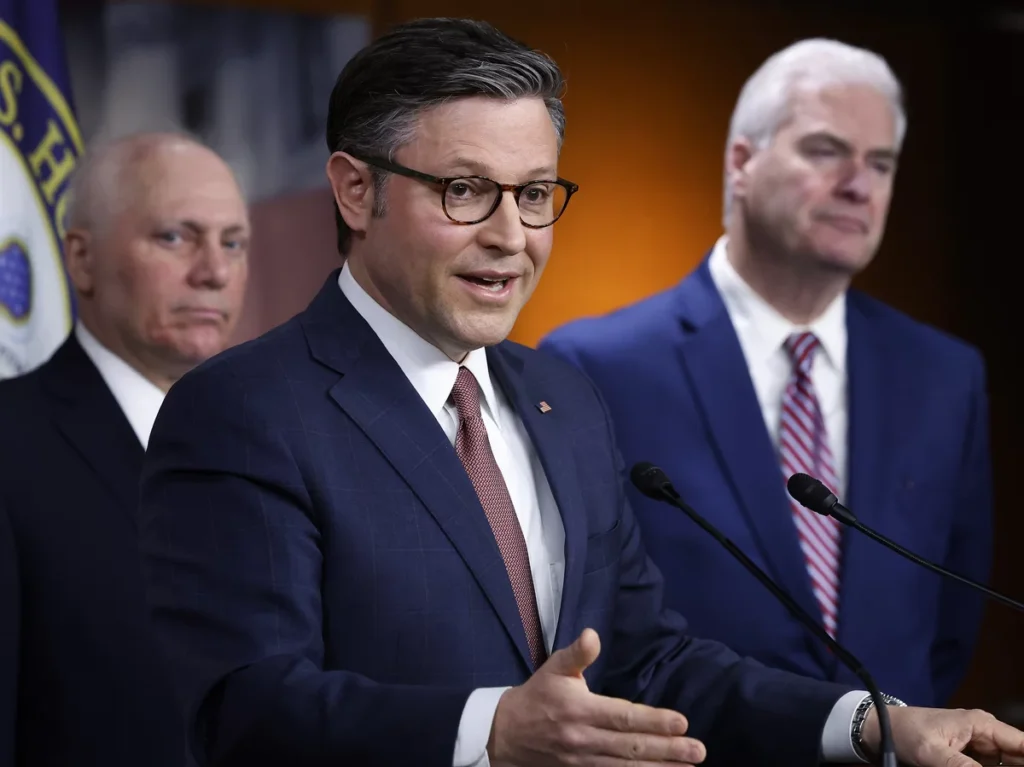Navigating the Fiscal Maze: The House’s Strategic Move to Prevent a Government Shutdown
In a critical juncture of American politics and fiscal management, the House of Representatives took a decisive step on Friday morning by passing six appropriations bills for fiscal year 2024. This move was not merely procedural but a strategic maneuver to avert a looming partial government shutdown, spotlighting the intricate dance of legislative governance and partisan negotiation.

The Crucial Countdown: Senate’s Role in Averting Crisis
The passage of these bills initiated a countdown, pressuring the Senate to act swiftly as the clock ticked towards the midnight deadline. The stakes were high, with the potential shutdown threatening to disrupt myriad federal operations and services, underscoring the urgency of the legislative process in maintaining governmental continuity.
Political Repercussions: The Spotlight on House Speaker Mike Johnson
Amidst this high-stakes legislative process, House Speaker Mike Johnson found himself at the epicenter of potential political turmoil. Republican Representative Marjorie Taylor Greene from Georgia catalyzed this by filing a motion to remove him as Speaker. This move highlighted the simmering tensions within the GOP and underscored the volatile nature of political leadership in a highly polarized environment.
Unpacking the $1.2 Trillion Package: A Comprehensive Overview
The package in question, amounting to a staggering $1.2 trillion, covered a vast spectrum of governmental functions. It included critical sectors such as defense, homeland security, financial services, general government, labor-health and human services (HHS), the legislative branch, and state-foreign operations. This comprehensive funding initiative was designed to sustain the federal government’s operations until the end of the fiscal year on September 30, illustrating the breadth and depth of federal budgetary considerations.
The Legislative Hurdle: Achieving Two-Thirds Support
Achieving the necessary two-thirds support for the bills’ passage was a significant legislative hurdle, reflecting the complexities of bipartisan cooperation in a divided Congress. The final tally of 286-134 votes was a testament to the intricate negotiations and compromises that underpin the legislative process in the U.S. Congress.
Signs of Strain: The Pre-Vote Tensions and Disagreements
The prelude to the vote was marked by tension and uncertainty, with warning signs on Thursday night indicating a possibly tighter vote than the GOP leadership anticipated. These moments highlighted the unpredictable nature of legislative politics, where shifting alliances and strategic considerations can dramatically influence the outcome.
The Stance of Dissent: Representative Robert Aderholt’s Objection
Representative Robert Aderholt of Alabama, chairing the Labor-HHS subcommittee, voiced his opposition to the package, citing concerns over earmarks added by senators. His statement reflected a broader discontent with the legislative process, where the integration of additional spending requests, or earmarks, can lead to significant discord and debate among lawmakers.
The Border Security Controversy: Republican Members’ Frustrations
A point of contention within the Republican ranks was the package’s perceived inadequacy in strengthening the Southern border. This frustration was compounded by the narrow window between the release of the 1000+ page text early Thursday morning and the subsequent Friday vote, highlighting the challenges of digesting and responding to complex legislative documents in a limited timeframe.
In Defense of the Package: Representative Ken Calvert’s Advocacy
Representative Ken Calvert of California, leading the appropriations subcommittee on defense, stood in staunch support of the package. He emphasized the dire national security implications of failing to pass the bill, framing the vote as a pivotal decision that could either uphold or endanger the country’s safety and global standing.
A Compromise Carved: Representative Rosa DeLauro’s Perspective
From the Democratic aisle, Representative Rosa DeLauro of Connecticut characterized the package as a negotiated compromise. She acknowledged the absence of total satisfaction on either side but highlighted the rejection of what she termed extreme cuts and policies proposed by House Republicans. Her remarks underscored the complex nature of legislative compromise, where differing priorities and visions must be reconciled to achieve a workable consensus.
The Negotiating Table: A Historic Female-Led Effort
DeLauro also celebrated the historic nature of the negotiations, which for the first time were led entirely by women from both chambers of Congress. This milestone marked a significant moment in the annals of U.S. legislative history, showcasing the increasing role of women in shaping the nation’s fiscal policies.
Deciphering the Package: Gains for Both Sides of the Aisle
The package itself was a battleground of political wins and concessions, with Republicans securing an increase in ICE detention beds and border agents, alongside cuts to NGO funding. They also successfully prevented regulatory actions like the banning of gas stoves and the flying of non-official flags at
